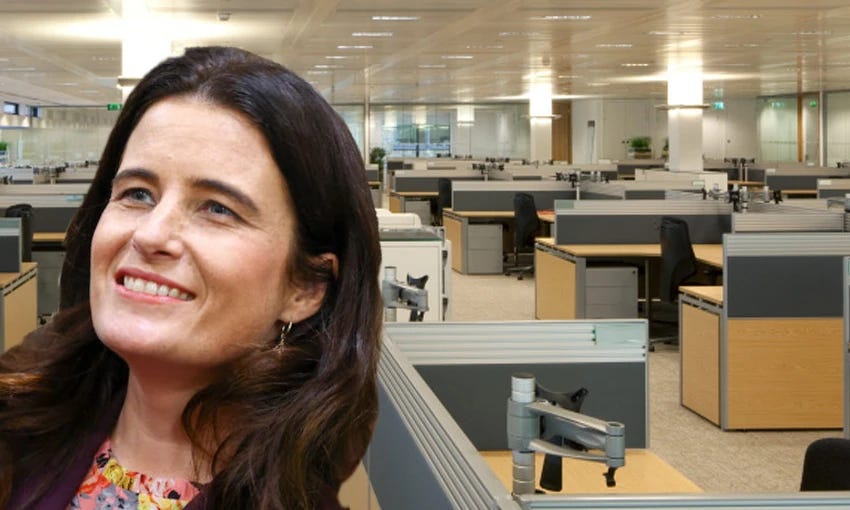The tax questions circling Chris Hipkins and Labour
The list of those in support of a capital gains tax has grown as Labour considers what it will campaign on in 2026.
Mōrena, and welcome to The Bulletin for Thursday, September 26.
In today’s edition: Health NZ is being urged to provide certainty over proposed hospital projects, wellbeing figures show life satisfaction is high, and Te Pāti Māori MP Tākuta Ferris will be pulled before the Privileges Committee. But first, the capital gains tax debate is heating up once again. Will Labour make a move?
The tax options on the table
Labour leader Chris Hipkins is currently in the United Kingdom where, reported the Herald’s Jamie Ensor last week, he is meeting with members of the new British Labour government. It comes as the party back home grapples with what to put forward to the electorate as part of its 2026 election campaign. And so far, many of the questions surround tax. Speaking to Newstalk ZB’s Ryan Bridge earlier this morning, Hipkins wasn’t prepared to get too into the weeds around what his party could campaign on. But, writing for The Spinoff this morning, Max Rashbrooke has picked out and broken down the most obvious (and some less obvious) tax options on the table for Labour’s forthcoming election campaign.
The “mainstream” option, he suggested, was the long-debated capital gains tax. New Zealand is virtually the only developed country that does not systematically tax capital gains, writes Rashbrooke, and “no one has ever satisfactorily explained why we remain a holdout”. A wealth tax is a more radical option and would be levied on existing assets as opposed to just the profits from selling them. Both will undoubtedly be considered as Labour prepares for 2026 – and support is coming from some unexpected places.
The debate heats up
A CGT and/or wealth tax has been rule in rule out fodder for Labour for some time now. It’s the issue that won’t go away. For the government, picking at Labour over tax will undoubtedly be a critical strategy. But as more and more people throw their weight behind some form of tax on capital gains, how sustainable will that approach be? Toby Manhire has compiled a fairly comprehensive list of everyone championing a CGT, and you’d have to say it makes the argument for putting it back on the table quite compelling.
Among those in favour, Mainfreight co-founder and rich lister Bruce Plested who told RNZ’s new webseries Rich that he supported a wealth tax, though caveated that by saying he was concerned the government of the day could “squander” the income raised. On another RNZ programme, 30 with Guyon Espiner, ANZ chief executive Antonia Watson said the time had come for a CGT. "In this country, people are investing in housing for the purpose of getting a capital gain on it. And if that's the purpose of it, why not have that as part of the tax take?” (Christopher Luxon wasn’t so convinced, reported RNZ’s Craig McCulloch: "I love it that the CEO of a big bank from Australia wants to take more money off New Zealanders," the PM said.)
Recent research based on OECD data and shared here by Bernard Hickey for The Kākā showed that the richest New Zealanders currently pay just a half to a third of the tax rates paid by equivalently rich people in other countries, largely because of how our tax system operates. The IRD is currently consulting on the future of the tax system, including whether a CGT or similar should be introduced. The OECD and the International Monetary Fund (IMF) have also, on more than one occasion, called for a CGT, as Brent Edwards reported in this paywalled report for the NBR. Nicola Willis discarded that advice at the time, telling parliament: “I can confirm there are three things that are certain in this world: death, taxes, and the IMF recommending a capital gains tax.”
A long-debated loophole
Meanwhile, a long-questioned tax loophole relating to companies masquerading as charities, and therefore exempt from paying tax, could be closed by the government. Earlier in the month, the Herald’s Thomas Coughlan reported that finance minister Nicola Willis said it “was on the tax policy work programme”, while the revenue minister Simon Watts recently told The Press it remained “under consideration”. Earlier in the year, prime minister Christopher Luxon said he was “quite open” to it and while it wasn’t a focus, “we will certainly be looking at things like that this term”.
That language all suggests we could finally see some movement on something that has been discussed and debated for decades. In the 1980s, a loophole was closed to stop “some individual taxpayers [avoiding] tax on their business income through the formation of so-called… ‘one-person’ charitable trusts”, reported The Press, noting that the “measures were aimed at removing the anomaly of the contrived tax-exempt status of businesses ostensibly conducted as charities”. But churches and “recognised” charities were left alone.
Could Labour get there first?
Before last year’s election, The Spinoff’s Toby Manhire argued that tackling the charity and churches loophole could have been a crafty move by National as it mulled how to fund its pricey tax cut package. That ultimately didn’t eventuate. But could Labour pick it up? The UK, where Hipkins is currently on his policy tour, closed the loophole over a century ago. Speaking to media last week, Hipkins said that charities engaging in commercial activity for profit should pay their share of tax. “We need to be careful we’re not making life more difficult for genuine charities, but where they are operating as commercial enterprises, I think that is a loophole that needs to be closed.”
Will either party put it squarely on the agenda?
Support our expanding mahi in the capital
If you value our coverage of all things Wellington, from our maps of bike networks, to local politics, to untold history, consider making a donation or becoming a member today.
Billions of dollars for hospital upgrades under review
Health NZ is being urged to provide certainty over the future of billions of dollars earmarked for hospital projects, Rachel Thomas at The Post has reported. As the agency continues to make cuts as part of a savings drive, attention has turned to $3.2bn worth of infrastructure projects. The figure is made up of 20 projects for which final decisions haven’t been made. Health NZ won’t confirm what those projects are, but documents obtained by The Post suggest half of the money has been set aside for the new Dunedin Hospital.
Health commissioner Lester Levy has reiterated that project will go ahead, but Labour’s health infrastructure spokesperson Tracey McLellan wants certainty. “Not only do communities potentially miss out on things that absolutely need to be done – they’re not nice to have – but the cost is going up. The cost of doing nothing goes up,” McLellan said.
Wellbeing figures show life satisfaction high, but trust in institutions slipping
New Stats NZ figures show that despite ongoing economic pressures, New Zealanders’ sense of general life satisfaction remains high. As Liam Dann reported for the Herald (paywalled), people aged 15 and over reported an average overall life satisfaction score of 7.6 out of 10 – similar to the mean rating of 7.7 out of 10 in 2021. Some groups reported less overall satisfaction: These included families composed of one parent, (7.0), disabled people (6.3), people with a household income of $30,000 or less (7.2) and LGBT+ people (6.9).
Despite these generally quite high numbers, Stats NZ reported a decline in people’s trust in several major institutions – including police, the media, parliament, the courts and the education system – since 2021. University of Auckland Business School's Clare Dale told RNZ’s Checkpoint this could have flow on consequences. “People don't vote if they don't trust, people don't help other people if they don't trust, the effects are profound.”
Have you subscribed to The Weekend with Madeleine Chapman?
It’s the perfect way to cap the week: a hand-picked selection of the best and biggest Spinoff reads along with some you may have missed. Plus, a special weekly column from The Spinoff’s editor Madeleine Chapman. Subscribe below, if you haven’t already, or find the accompanying podcast Behind the Story wherever you get your podcasts.
Click and Collect
The Privileges Committee will consider whether Te Pāti Māori MP Tākuta Ferris misled the House with comments he made during last week’s general debate.
Report into power pylon debacle fails to address compensation.
Queenstown Lakes' restrictive freedom camping rules deemed “invalid”.
Kāinga Ora is set to cut 321 roles, on top of those announced in a previous restructure, which takes the total to 553.
First reported by the Herald’s Shayne Currie yesterday, it’s since been confirmed that PM Christopher Luxon’s chief press secretary is resigning.
Documents reveal how the government reacted to the global tech outage a few months ago.
Joel MacManus conducts a cost-benefit analysis on allowing public servants to return to the office. Tara Ward power ranks week three of Celebrity Treasure Island. Publisher Maiko Lentin-Lu shares the struggles of always reading books that haven't come out yet for The Spinoff Books Confessional. Liam Rātana wonders whether parliament is in a state of decay. Claire Mabey begs director Emerald Fennell not to “Saltburnify” Wuthering Heights. Alex Casey considers the rich person influencing going on in Taika Waititi's Instagram. Hera Lindsay Bird considers the dangers of Googling murder methods.
That’s it for this morning, thanks for reading. I’ll catch you back tomorrow.
Want to get in touch? Join the conversation in the Substack comments section or via email at thebulletin@thespinoff.co.nz if you have any feedback on today’s top stories (or anything else in the news).
If you liked what you read today, share The Bulletin with friends, family and colleagues.

















A Capital Gains Tax is well overdue, and would solve multiple problems, including speculation on housing stocks.
Charities receive a tax exemption on income. People donating to charities receive a tax exemption on the donation. The problem that we have is that there are many charities that engage in commercial activity, and as a charity their profits are exempt from tax, but there is no obligation to actually use any of the profit for charitable purposes. Think iwi, church organisations like Sanitarium, etc. One answer might be to tax the profits, and where those profits are used for charitable purposes, then they receive a tax exemption. That might encourage more charitable fiving. Otherwise, the State is simply subsidising commercial businesses.